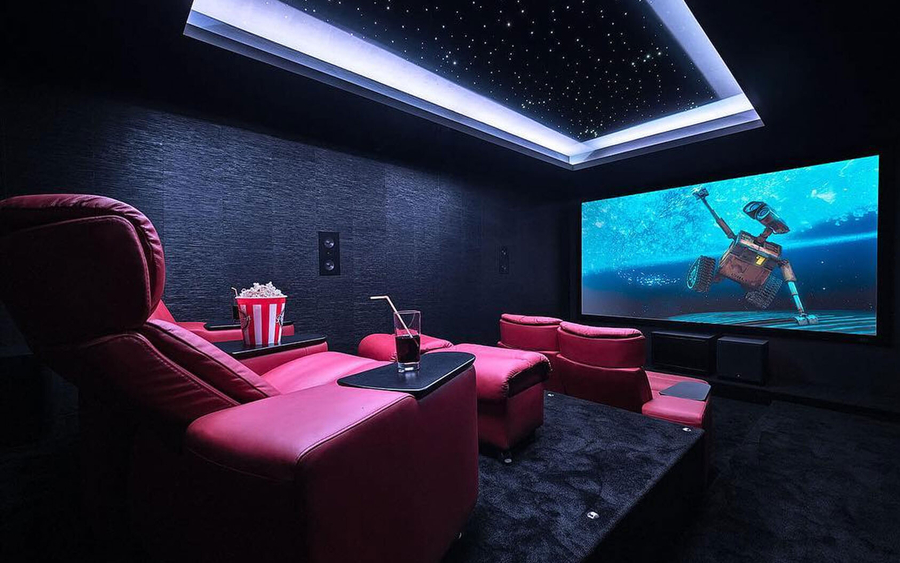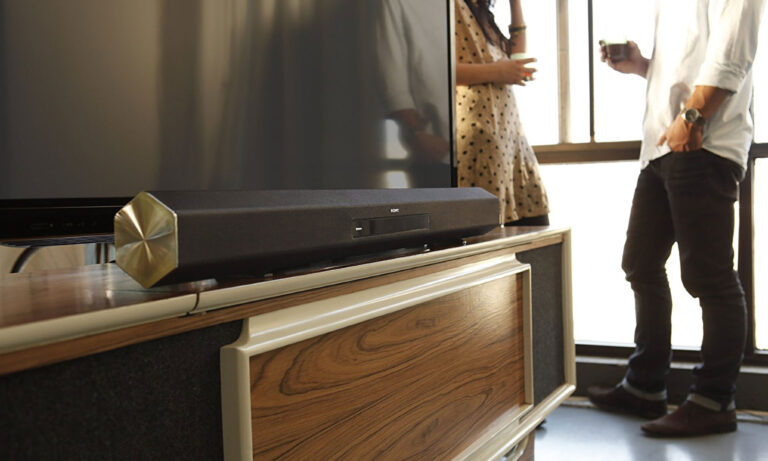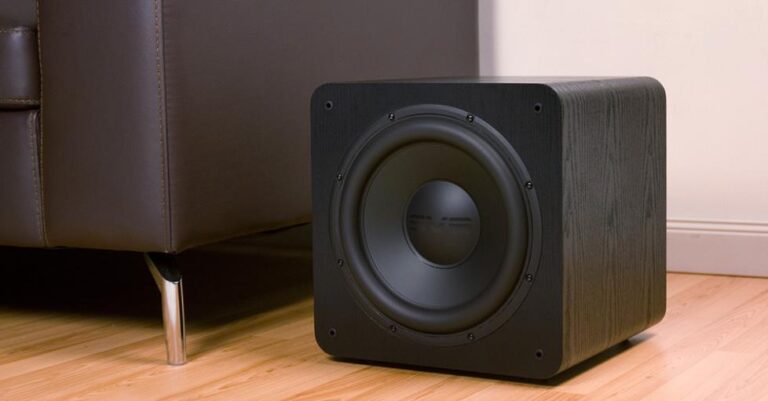In the realm of service industries, the question of tipping often arises, ushering in a multitude of viewpoints. One such service that has recently entered this conversation is home theater installation – a specialized skill set that entails a combination of electrical expertise, sound engineering, and astute aesthetic sensibilities.
An essential question that consumers often grapple with is whether or not it is customary to tip these professionals post-completion of their work. While some argue that the installation fee sufficiently covers the labor, others insist that a tip is a tangible token of appreciation for a job well done.
Exploring this debate further might offer some clarity and help shape a consensus on this contentious issue.
Key Takeaways
- The cost of home theater system installation can vary greatly and include charges for labor and materials.
- Tipping etiquette is important in service industries to acknowledge the effort and expertise of professionals and compensate for additional services provided.
- Tipping installers show appreciation for their expertise, physical labor, and exceptional professionalism.
- Public opinion on tipping home theater installers varies widely and can be influenced by regional customs, personal values, past experiences, cultural differences, and gratuity legislation.
Understanding Home Theater Installation Charges
While the cost of a home theater system itself can vary greatly, it is equally important to understand the potentially significant charges associated with professional installation. The Installation Pricing Breakdown can be intricate and is typically contingent on a range of factors, including the complexity of the system, the layout of the house, and the specific requirements of the homeowner.
In a standard installation, the primary costs encompass labor, which includes the time and skill required to set up the system and materials. Labor costs typically depend on the amount of work involved, while material costs cover items like cables, brackets, and other essentials.
It’s also crucial to be aware of the Hidden Installation Costs that may not be readily apparent. These can include the cost of custom work, such as in-wall or in-ceiling speaker installation, or additional charges for running wires through complex areas. Furthermore, unexpected difficulties like hard-to-access areas can increase costs.
Tipping Etiquette in Service Industries
In service industries, understanding the appropriate tipping etiquette is paramount, as it plays a significant role in acknowledging the effort and expertise of professionals involved in providing a particular service. This holds for a wide array of services, including but not limited to home theater installation, restaurant services, and taxi services.
Restaurant tipping norms, for instance, generally suggest that patrons tip anywhere from 15% to 20% of the total bill before tax. This is done to appreciate the waiter’s service, which often extends beyond merely serving food. It encompasses a range of tasks like taking orders, ensuring timely delivery, and providing a pleasant dining experience.
Similarly, taxi driver gratuity is also a common practice, often calculated as 10% to 15% of the fare. This is in recognition of the driver’s responsibility to ensure a safe, comfortable, and efficient journey. Tipping also compensates for any additional services provided by the driver, such as handling luggage or navigating through traffic during peak hours.
Reasons to Consider Tipping Installers
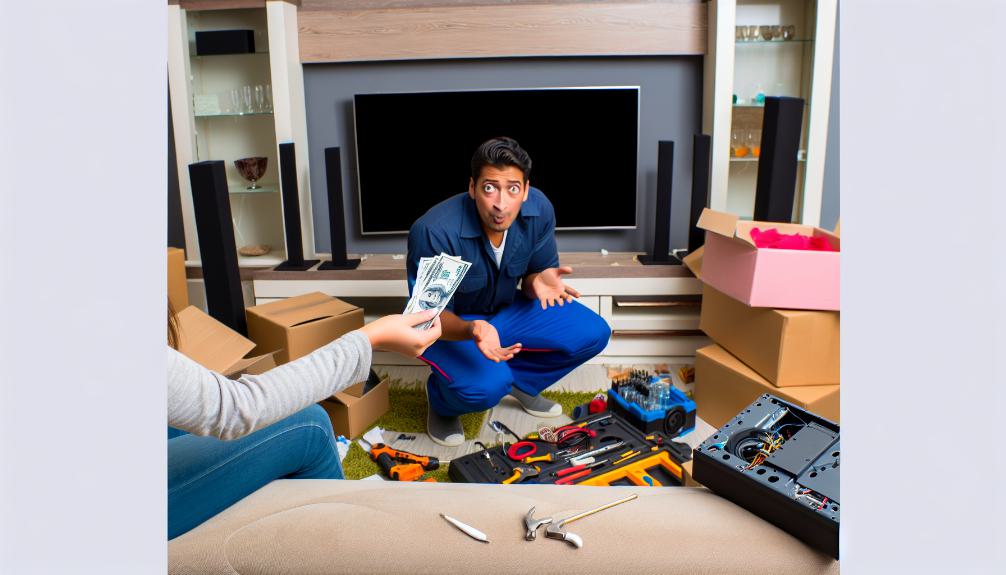
Just as tipping is customary in the restaurant and taxi industries, it is also worth considering when engaging the services of home theater installers. This act of generosity serves as a tangible Gratitude Expression for the hard work, skill, and dedication these professionals bring to their craft.
There are several compelling reasons to consider tipping your installer:
- Installer Appreciation: Tipping is a direct way to express your appreciation for the professional’s expertise and meticulous attention to detail. It acknowledges the complex nature of their job and the value it adds to your home.
- Above and Beyond Service: If the installer goes beyond their basic duties, such as spending extra time on customization or troubleshooting, a tip is a fitting way to recognize these efforts.
- Physical Labor: Installing a home theater system is physically demanding work, often performed in cramped or uncomfortable conditions. A tip can serve as an acknowledgment of this physical exertion.
- Cordiality and Professionalism: If the installer conducts themselves with exceptional professionalism and friendliness, tipping can serve as a reward for excellent customer service.
Surveying Popular Opinions on Tipping
Public opinion on the practice of tipping home theater installers varies widely, with perspectives influenced by factors such as regional customs, personal values, and past experiences. The diverse opinions reflect the complexity of the topic and the influence of Cultural Tipping Differences.
In countries where tipping is customary (for example, the United States), many individuals extend the practice to home theater installers, considering it a token of gratitude for excellent service. In contrast, in regions where tipping is not a norm, individuals may perceive such gratuity as unnecessary or even inappropriate. This demonstrates the significant impact of cultural norms on tipping behaviors.
The Gratuity Legislation Impact also plays a pivotal role in shaping public opinion. In areas where laws mandate service charges or minimum wage requirements, the need to tip may become redundant, causing a shift in popular opinion. Conversely, in regions where such legislation is absent, tips often serve as a critical supplement to service industry workers’ incomes.
Making Your Tipping Decision
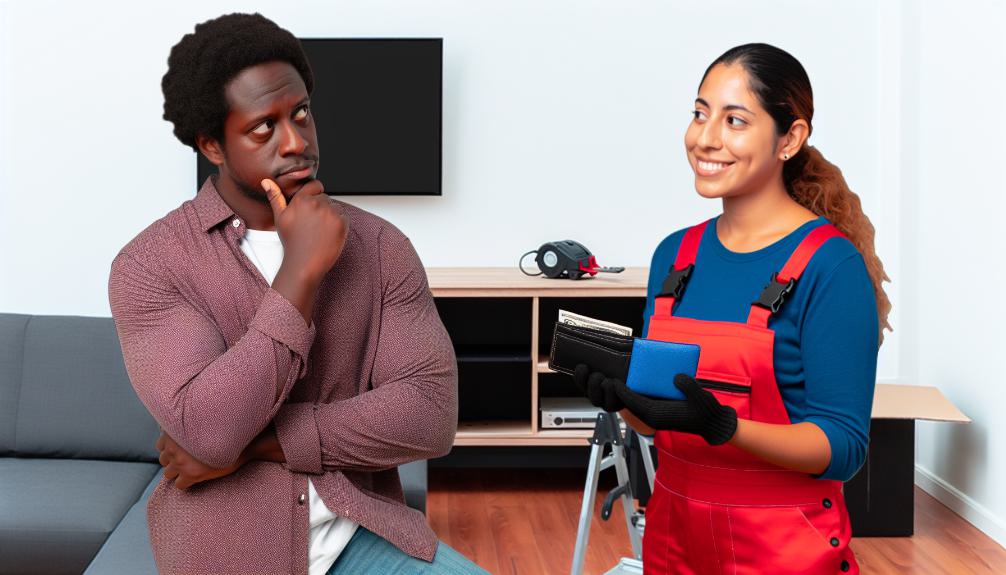
Given the wide spectrum of opinions and the influence of regional customs and legislation, it becomes essential to make an informed personal decision about tipping home theater installers. While there’s no universal rule, factors such as cultural differences and the installer’s effort can guide your decision.
- Cultural Differences: Tipping practices vary widely across the globe. In some cultures, tipping is considered obligatory, while in others, it may be seen as an insult. Research the standard practices in your region or ask the company directly about their tipping policy.
- Installer’s Effort: Consider the complexity of the task. If the installers went above and beyond, worked under challenging conditions, or offered exceptional customer service, a tip is a great way to show your appreciation.
- Quality of Service: Assess the overall quality of the service rendered. Did the installers arrive on time, respect your home, and leave the area clean? These factors can influence your decision to tip.
- Company Policy: Some companies may discourage or prohibit their employees from accepting tips. Always check the company’s policy before offering a tip to avoid awkward situations.
Final Thoughts
While there is no hard and fast rule regarding tipping home theater installers, consideration of the service quality, expertise, and effort involved may justify a gratuity.
Public opinion varies widely on this issue, reflecting a lack of uniformity in tipping norms.
Ultimately, the choice to tip lies within the discretion of the client, who must weigh the perceived value of the service against personal financial constraints and societal expectations.
Frequently Asked Questions
What Is the Average Duration of a Home Theater Installation Job?
The average duration of a home theater installation job depends on various factors, such as installation challenges and necessary equipment. Generally, it may take between 4 to 12 hours, depending on the system’s complexity.
Do All Home Theater Installation Services Have a Fixed Rate, or Does It Vary?
Home theater installation service rates often vary depending on factors such as installation quality and complexity. Additionally, payment options can differ among providers, with some offering package deals or tiered pricing structures.
What Are Some Possible Additional Charges That Could Increase the Cost of the Installation?
Additional charges can include hidden costs like extra cabling, mounting brackets, or specialized tools. Installation extras such as advanced system programming, custom cabinetry, or soundproofing may also increase the cost of home theater installation.
Are Home Theater Installers Usually Employed by the Company, or Are They Independent Contractors?
Home theater installers may be company employees or independent contractors, depending on the business model. Installer qualifications vary, with contractors often benefiting from flexible schedules and the ability to choose their projects.
Are There Any Potential Legal Issues Related to Tipping Home Theater Installers?
Potential legal issues related to tipping home theater installers primarily involve tax liability. However, tipping etiquette generally allows for gratuities, given the service is exceptional. Always consult tax professionals for specific legal implications.

